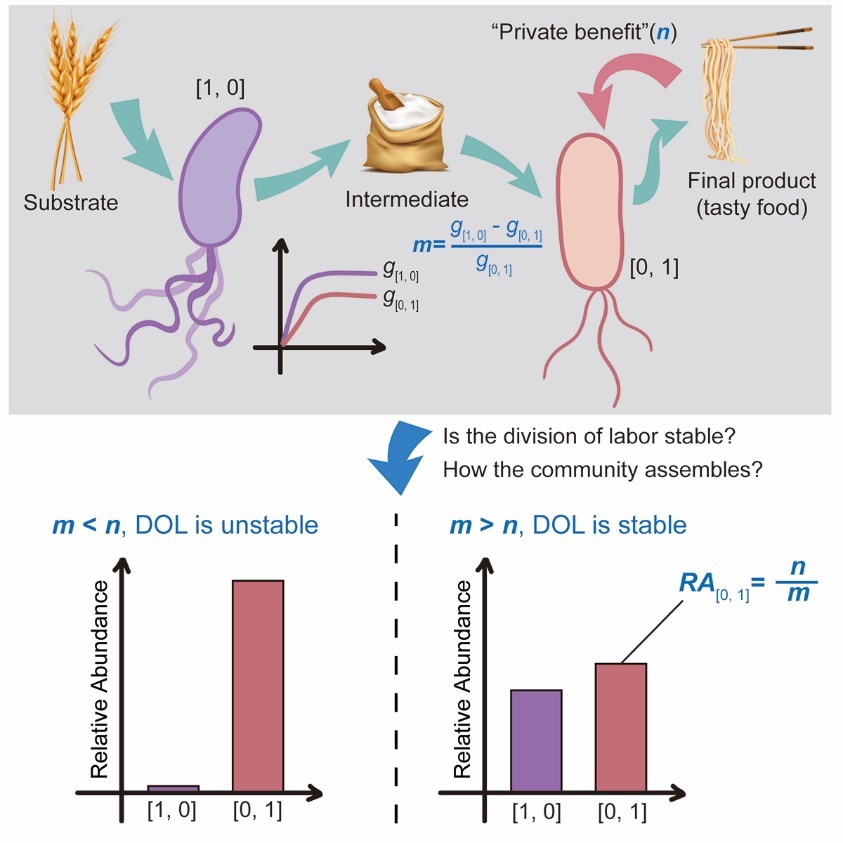Peking University November 26, 2022: Cell Reports recently published an article entitled “Even allocation of benefits stabilizes microbial community engaged in metabolic division” written by Wu Xiaolei and Nie Yong’s group from the College of Engineering at PKU. They derived a theoretical framework that accurately predicts the assembly of their synthetic consortia that degrade naphthalene through metabolic division of labor (MDOL). It provides insights for designing and managing stable microbial systems for metabolic pathway optimization.
In
The Wealth of Nations, Adam Smith points out that the division of labor is one of the main ways to improve labor productivity and increase national wealth. Like other higher organism groups, such as humans, microbial communities are complex, highly organized “societies”. Microbial communities execute metabolic pathways to drive global nutrient cycles. Within a community, functionally specialized strains can perform different yet complementary steps within a linear pathway, a phenomenon termed MDOL (see Figure 1). Many important metabolic processes in nature, such as nitrification, anaerobic oxidation of methane, and degradation of complex organic matter, are accomplished in the form of MDOL. However, little is known about how such metabolic behaviors shape microbial communities and how division of labor communities exist in a stable manner. Wu and Nie’s group traced its cause to inequality rather than want.

Figure 1
Wu and Nie’s group has found that the properties of the substrate, such as its concentration and toxicity, largely affected the assembly of a community engaged in MDOL community and has studied the spatial patterns of MDOL community. Based on these studies and a mathematical model describing the dynamics of the MDOL community, the group established a more streamlined and comprehensive theoretical framework for predicting the stability and assembly characteristics of this community through rigorous mathematical derivation. The framework indicates that to ensure community stability, the strains performing the initial steps should hold a growth advantage (m) over the ‘‘private benefit’’ (n) of the strain performing the last step. The steady-state frequency of the last strain is then determined by the quotient of n and m.
The analysis showed that the assembly of the MDOL community can be determined by a finite number of parameters. This quantitative prediction rule will help us understand the principles of the construction of natural microbial communities and provide new perspectives for understanding the design construction and metabolic pathway optimization of stable microbial systems. An anonymous reviewer of this paper noted, “I believe this work makes an outstanding contribution to the study of metabolic pathway optimization for microbiome engineering. It is the first time that a combination of mathematical modeling and experimental analysis has been used to study microbial MDOL. It is a perfect combination of theory and experimental validation. The mathematical principles obtained from the study are fabulous and they are strongly supported by experimental data.”
The first author of this paper is Wang Miaoxiao, Ph.D. 2021, College of Engineering, Peking University. He is currently a postdoctoral researcher at ETH Zurich. Wu Xiaolei and Nie Yong are co-corresponding authors of this paper. Chen Xiaoli and Liu Xiaonan, Ph.D. students at the College of Engineering at Peking University, participated in the analysis of the research results. Professor Martin Ackermann from ETH Zurich contributed to the study. This paper was awarded the Outstanding Paper of the “Jane Haoran Environmental Microbiology Foundation” at the 23
rd National Symposium on Environmental Microbiology. This research was supported by the National Key R&D Development Program of China (2018YFA0902100) and the Sino-Swiss Science and Technology Cooperation (32161133023).
Written by: Zhao Mengyu
Edited by: Ma Yaoli
Source: PKU News (
Chinese)
